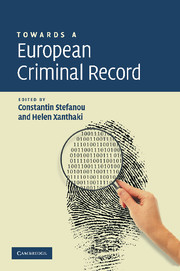Book contents
- Frontmatter
- Contents
- List of contributors
- Preface and acknowledgements
- 1 Introduction: How did the idea of a European Criminal Record come about?
- PART I
- PART II
- 5 The European Criminal Record in Austria
- 6 The European Criminal Record in the Czech Republic
- 7 The European Criminal Record in Germany
- 8 The European Criminal Record in Greece
- 9 The European Criminal Record in Hungary
- 10 The European Criminal Record in Ireland
- 11 The European Criminal Record in the Netherlands
- 12 The European Criminal Record in Slovenia
- 13 The European Criminal Record in Slovakia
- 14 The European Criminal Record in Spain
- 15 The European Criminal Record in England and Wales
- PART III
- 19 Conclusions
- Index
14 - The European Criminal Record in Spain
Published online by Cambridge University Press: 13 July 2009
- Frontmatter
- Contents
- List of contributors
- Preface and acknowledgements
- 1 Introduction: How did the idea of a European Criminal Record come about?
- PART I
- PART II
- 5 The European Criminal Record in Austria
- 6 The European Criminal Record in the Czech Republic
- 7 The European Criminal Record in Germany
- 8 The European Criminal Record in Greece
- 9 The European Criminal Record in Hungary
- 10 The European Criminal Record in Ireland
- 11 The European Criminal Record in the Netherlands
- 12 The European Criminal Record in Slovenia
- 13 The European Criminal Record in Slovakia
- 14 The European Criminal Record in Spain
- 15 The European Criminal Record in England and Wales
- PART III
- 19 Conclusions
- Index
Summary
Introduction
Re-education and social rehabilitation of offenders are constitutional principles in Spain. The law also states that criminal records can never justify legal or social discrimination. In Spain criminal records mainly serve to determine penalties: their existence may aggravate penalties imposed on recidivists. They also serve to classify offenders, in access to some forms of employment, or in obtaining some authorisations, such as the right to carry guns. Criminal records that entail a criminal responsibility are included in the national criminal record and cancelled after a short period, compared to other jurisdictions, once the criminal liability has ended. Only judges have access to cancelled criminal records but those have no legal effect whatsoever.
Criminal records are not public. The law states that only the person concerned or his/her representatives and the judiciary can access criminal records in Spain. The constitutional court has also proclaimed this doctrine No other person or institution has access to them. The current Spanish legal system and doctrine could accept the creation of a European register of criminal records only if the principles established to rule it were compatible with those governing the Spanish one, namely a register with a judicial character, with access limited to the judiciary and those concerned and cancellation of records after a reasonable period of time to facilitate and guarantee social rehabilitation of ex-offenders.
- Type
- Chapter
- Information
- Towards a European Criminal Record , pp. 267 - 290Publisher: Cambridge University PressPrint publication year: 2008



